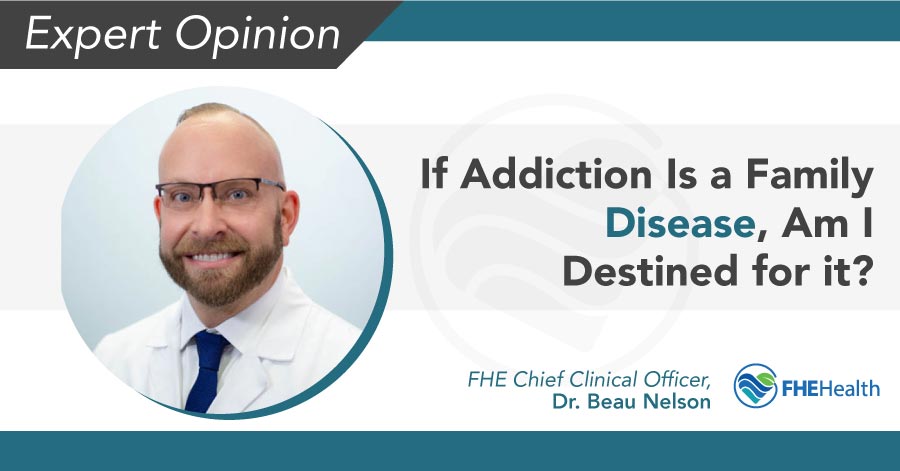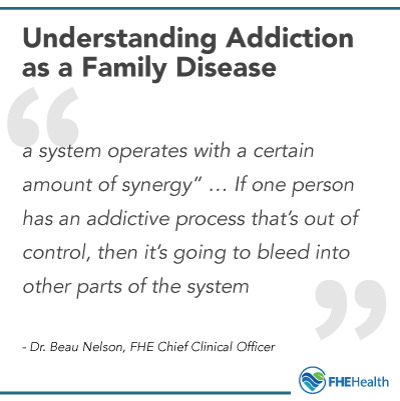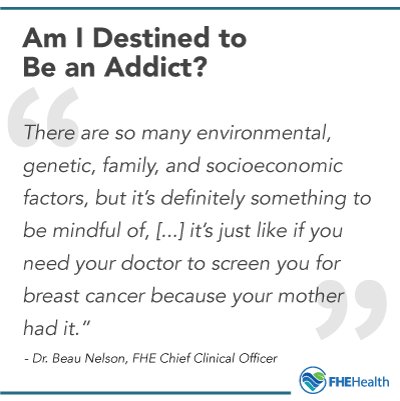
This article has been reviewed for accuracy by our peer review team which includes clinicians and medical professionals. Learn more about our peer review process.
Experts often refer to addiction as a “family disease,” but what might that mean for someone with a family history of addiction? Are they doomed to inherit the disease just because it runs in the family? And what does the term “family disease” mean, anyway?
These are high-stakes questions for the millions of Americans who live with or have an addicted family member—they need trusted answers. Dr. Beau Nelson, Chief Clinical Officer at FHE Health, is regularly asked to share his expertise on issues relating to addiction and the family system. In a recent interview, he helped explain the clinical concept of addiction as a family disease and its implications for anyone worried about a genetic predisposition to substance abuse…
What Does It Mean to Say Addiction Is a “Family Disease”?
First, when clinicians say that addiction is a family disease, what are they really talking about? They are referring to the “systemic” nature of families and that the disease occurs within a family system and affects the whole system. Dr. Nelson used the metaphor of a car with a flat tire: “The idea is that a family is a system, and a system is interwoven. You might have one flat tire on your car, but although it’s the tire’s problem, doesn’t the whole car shake?”
In other words, “a system operates with a certain amount of synergy” … If one person has an addictive process that’s out of control, then it’s going to bleed into other parts of the system.”
Addiction Family Diseases vs. Other Family Diseases
When one person in a family has an addiction, the family dynamics can change as a way of compensating for or accommodating the dysfunction:
- Other family members may unknowingly enable the addicted person’s choices and behaviors.
- They may try to hide or excuse the addiction or assume more than their fair share of responsibility within the family system.
- Their roles change and impact other family relationships (i.e., supportive mom vs. “tough love” dad).
Apart from these distinguishing family dynamics, addiction is like other medical conditions that can run in families, from diabetes to breast cancer. That means there is a significant genetic risk factor for addiction that runs in families.
Genetic Risk Factors for Addiction and Other Biological Factors – How Influential Are They?
 Just how influential is this genetic component in determining whether a person will develop a drug or alcohol addiction? Very influential. Dr. Nelson quoted data cited by the National Institute on Drug Abuse, which revealed that genetic factors account for 40-60 percent of a person’s vulnerability to addiction.
Just how influential is this genetic component in determining whether a person will develop a drug or alcohol addiction? Very influential. Dr. Nelson quoted data cited by the National Institute on Drug Abuse, which revealed that genetic factors account for 40-60 percent of a person’s vulnerability to addiction.
By “genetic factors,” scientists mean there is no one single gene that can predict whether someone will become an addict—it’s more like “a constellation of genes,” according to Dr. Nelson.
“Remember the body is a very complex system,” he said. He went on to explain that the body “runs on chemicals”—like the pleasure neurotransmitter dopamine—and that “there are compensatory actions that happen” when the body takes in substances like drugs or alcohol over an extended period of time. The neurochemistry of the brain and body can change.
This complex interplay is what scientists sometimes refer to as the “epigenetics” of addiction, meaning that the substances that people put into their system can over time change genetic expression and make-up. Part of that process can include the cumulative changes in the brain that over time signify the disease of addiction: “There’s a physical change when people use drugs, and this elicits a chemical change that produces a reinforcing state.”
What Genetic Risks for Addiction Might Mean
But if a family history and genetic factors can raise a person’s risks for addiction by as much as 40 to 60 percent—isn’t that a high risk? “40-60 percent is pretty high.” What might it mean for someone who is genetically at risk?
“We’re more likely to end up with a serious problem just from dabbling.” That’s because…
…there’s a lot of correlation between addicted relatives and using substances. The body is a system that tries to maintain balance, so you tend to find people who are unbalanced (with weight, hormones, chemicals, moods, etc.)—they will be far more vulnerable to destructive behaviors.
Family History Biggest Risk Factor for Substance Abuse
However important the role of genetics and biology may be in contributing to addiction, a family history tends to be the biggest risk factor for substance abuse—regardless of the substance, according to Dr. Nelson. This conclusion by scientists squares with his own more anecdotal experience working with patients and families. A common thread is that family history, even if the reactions may be different:
I see in a lot of families either the fear or an inability to recognize the seriousness [of a family history]. Lots of people have different reactions to substance abuse or addictive disorders in the family.
There are lot of people who don’t recognize what it means to have this higher risk factor. A lot of people hide these risk factors and don’t talk about them, but often there’s a family connection.
This is also true with genetically inherited mental health disorders.
Lifestyle and Other Implications for Those with Genetic and Family Risk Factors
 Genetic or family risks for addiction are important considerations but do not need to be cause for alarm or fatalism. Just because someone has these risk factors does not predestine them for the disease. What it does mean is that it “requires us to be a little more aware and conscious of the choices we’re going to make. It’s not like you’re just destined, and there’s nothing you can do about it.”
Genetic or family risks for addiction are important considerations but do not need to be cause for alarm or fatalism. Just because someone has these risk factors does not predestine them for the disease. What it does mean is that it “requires us to be a little more aware and conscious of the choices we’re going to make. It’s not like you’re just destined, and there’s nothing you can do about it.”
“There are so many environmental, genetic, family, and socioeconomic factors, but it’s definitely something to be mindful of,” Dr. Nelson said, noting as illustration that “it’s just like if you need your doctor to screen you for breast cancer because your mother had it.”
In other words, “take care of yourself. If your family has a history of diabetes, are you going to pretend it doesn’t exist? Be healthy and educate yourself. You can’t pretend it doesn’t exist.
Dr. Nelson also emphasized the importance of honesty about addiction or mental health disorders that may run in the family:
Young children and teenaged kids are often not told about processes in their family. It’s important that people be forewarned. Have those conversations. It’s much better to have a really uncomfortable conversation than have a situation come up that you weren’t aware of … If you know about [the addiction and/or mental illness], that’s actually a plus, because it shows you that it’s something that needs to be on the radar. It shows you that you need to be aware of the risk factors. It doesn’t mean that you’ll die of addiction, but be forewarned and forearmed … And yes, there may be some lifestyle choices to consider.
In other words, nobody is ever “destined” for addiction because of a family history or genetic predisposition. You can chart a healthier path, and it starts with greater awareness.






